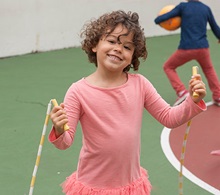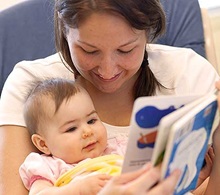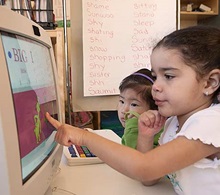 Child Development through Structured & Unstructured Play
Child Development through Structured & Unstructured Play
Structured play is the kind of play where there is typically an adult leader and a specific, planned way in which the play will go. For example, organized sports or dance classes are structured play. Premier Academy offers an array of structured indoor activities through various companies in the community. Playing a board game with specific rules and directions with an adult playing or looking on is also an example of structured play. Your child can benefit from finding the right structured play activities but it should be complemented with opportunities for unstructured play. These are the types of activities that are typically child-directed with no set goals or direction.
The Benefits of Unstructured Play for Kids
Why is unstructured outdoor play important? There are so many benefits. A few are below:
- Children need more physical activity. Many sources agree that today’s children are too sedentary. In addition to 20 – 30 minutes of daily structured physical activity, children should get at least 60 minutes of unstructured physical activity daily, and more is even better. Premier Academy is dedicated to providing the best childcare and quality childcare. In order to achieve this, we provide an amazing indoor gym and huge outdoor play area so that all of our kids get their necessary large motor play time.
- Unstructured outdoor play offers opportunities to develop executive function skills. Executive function skills have been compared to an air traffic control system in each of our bodies. These essential life skills help us remember information, filter out distractions, switch gears when needed, and sustain focus over time (Harvard University Center on the Developing Child, 2015). Among the many benefits of imaginary play, one is helping children develop these executive function skills. Children develop rules for the imaginary scenarios they create, remember and try out complex ideas, apply the rules to the scenarios as they go along, and regulate each other’s behavior. Given the time, children can extend imaginary play for hours.
- Children who play outdoors regularly are less likely to be nearsighted (Shephard, 2015). Sunshine and natural light help children have better distance vision.
- Social skills are enhanced. There are many different skills children learn from unstructured activities. Children who have opportunities to work together with their childcare peers towards a goal learn friendship skills such as teamwork, problem-solving, care and cooperation, all critical skills for school and life.
Younger Children and Unstructured Outdoor Play
Younger children need closer supervision than school-agers. You can help them get started by asking them what they could do with a basket of smooth stones or a net bag filled with balls of varying sizes. Then step back, keep them in view, but let the play unfold and resist the urge to intervene too much. (Note: children also benefit greatly by having you engage in play with them; but occasionally let them figure out the direction of the play with their peers without much adult intervention). Consider loose parts for a variety of open-ended play possibilities. Examples of loose parts include natural items like sticks and stones of varying sizes, sand, water, small logs, and leaves and/or man-made items like hula hoops, balls, jump ropes, stepping stones, trikes, wheelbarrows, buckets, tubes, large blocks, or sifters. The possibilities are endless with these kinds of materials.
Children want to play outside because it is fun. That is enough of a reason to offer it. Look for ways to build unstructured outdoor play into your child’s week with many potential benefits for your child.

 Some children are born social butterflies, intuitively understanding the art of making and keeping friends. Other children need a bit more support. Many children are naturally quiet or reserved and may not know how to start a conversation. Others need help in reading social cues, sharing toys, or taking conversational turns.
Some children are born social butterflies, intuitively understanding the art of making and keeping friends. Other children need a bit more support. Many children are naturally quiet or reserved and may not know how to start a conversation. Others need help in reading social cues, sharing toys, or taking conversational turns. With the winter months coming upon us, we find that our children are at risk for infections and colds. Taking care of a sick toddler isn’t fun. But taking care of two sick children is worse. It means more misery and sleepless nights — and for you, more missed days of work.
With the winter months coming upon us, we find that our children are at risk for infections and colds. Taking care of a sick toddler isn’t fun. But taking care of two sick children is worse. It means more misery and sleepless nights — and for you, more missed days of work. Reading to infants contributes to the development of their growing brains and gives them a good start towards a lifelong love of reading and good literature. When you read to babies, it can also help speech development as they are taking in information and beginning to learn about speech patterns. In addition, synapses connect between your infant’s neurons as you read aloud, positively affecting child development in many areas. Choosing a childcare that understands the importance of reading can set your child on the path to healthy development.
Reading to infants contributes to the development of their growing brains and gives them a good start towards a lifelong love of reading and good literature. When you read to babies, it can also help speech development as they are taking in information and beginning to learn about speech patterns. In addition, synapses connect between your infant’s neurons as you read aloud, positively affecting child development in many areas. Choosing a childcare that understands the importance of reading can set your child on the path to healthy development. You’ve probably heard about the benefits of nature and outdoor play for children. According to the National Wildlife Federation, outdoor play boosts fitness and decreases the risk of childhood obesity; increases focus and academic achievement at your child’s daycare; and reduces stress and increases feelings of well-being.
You’ve probably heard about the benefits of nature and outdoor play for children. According to the National Wildlife Federation, outdoor play boosts fitness and decreases the risk of childhood obesity; increases focus and academic achievement at your child’s daycare; and reduces stress and increases feelings of well-being. Work-life balance has long been considered a strict separation between work and personal life, but the lines between the two have gradually become blurred, attributable to the technology advancements which allow people to be constantly connected and businesses to be active and accessible at all times without boundaries. With the capabilities of modern technology, work-life integration, a concept in which work and life are intertwined, is emerging and is perceived to be the future of the working world. The new reality is that many fields allow employees to work remotely at least one day of the work week. This, coupled with an ever increasing global workplace, has brought change to the traditional nine to five work day.
Work-life balance has long been considered a strict separation between work and personal life, but the lines between the two have gradually become blurred, attributable to the technology advancements which allow people to be constantly connected and businesses to be active and accessible at all times without boundaries. With the capabilities of modern technology, work-life integration, a concept in which work and life are intertwined, is emerging and is perceived to be the future of the working world. The new reality is that many fields allow employees to work remotely at least one day of the work week. This, coupled with an ever increasing global workplace, has brought change to the traditional nine to five work day. As technology becomes more accessible and affordable, more and more families are using it and when you are looking for a Nebraska daycare, you should look for a center that understand the correct use of technology for all ages. According to a 2013 study by Common Sense Media, an organization dedicated to helping families use technology wisely, 75 percent of children under the age of 8 have access to a tablet or mobile device, an increase of 25 percent in just two years. And that number is growing every year.
As technology becomes more accessible and affordable, more and more families are using it and when you are looking for a Nebraska daycare, you should look for a center that understand the correct use of technology for all ages. According to a 2013 study by Common Sense Media, an organization dedicated to helping families use technology wisely, 75 percent of children under the age of 8 have access to a tablet or mobile device, an increase of 25 percent in just two years. And that number is growing every year. 90% of parents cited academic preparedness as being the most important factor in their child’s quality childcare. They want to ensure that their children are prepared to meet or exceed academic expectations and possess the ability to apply their skills in reading, writing and math.
90% of parents cited academic preparedness as being the most important factor in their child’s quality childcare. They want to ensure that their children are prepared to meet or exceed academic expectations and possess the ability to apply their skills in reading, writing and math.